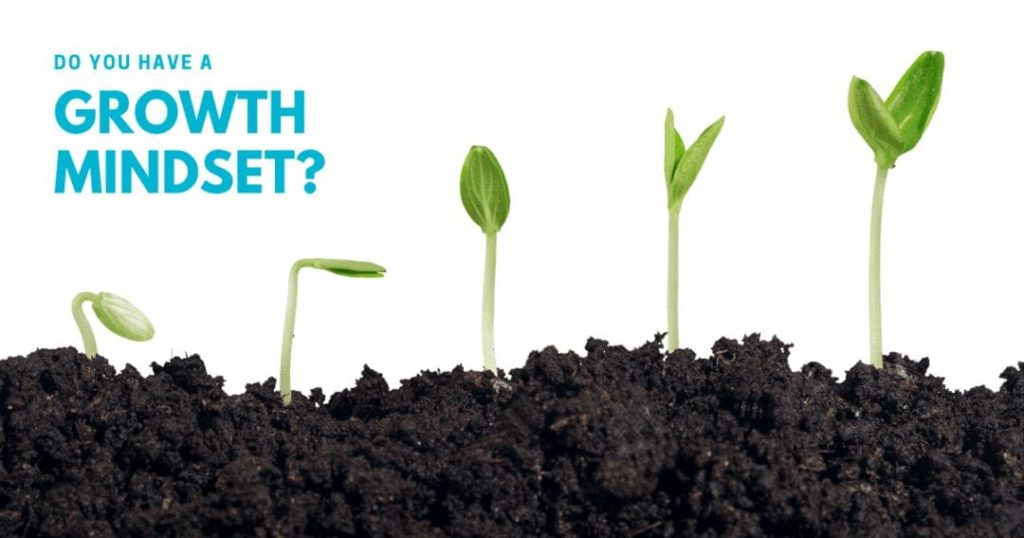Stanford University psychologist Carol Dweck has discovered a simple but ground-breaking idea: The Power of Mindset after decades of research. In her remarkably insightful book titled Mindset: The New Psychology of Success, Dweck shares insight on the two main mindset: growth mindset and fixed mindset.
Fixed Mindset

A “fixed mindset” assumes that our character, intelligence, and creative ability are static givens which we can’t change in any meaningful way, and success is the affirmation of that inherent intelligence, an assessment of how those givens measure up against an equally fixed standard; striving for success and avoiding failure at all costs become a way of maintaining the sense of being smart or skilled.
People with a fixed mindset spend their time documenting their intelligence or talent instead of developing them. They also believe that talent alone creates success – without effort. When face with challenges that they can’t solve, they give up and admit defeat which is detrimental to their future efforts and leads to limited growth.
If you have a fixed mindset or know someone who has a fixed mindset, we have good news for you. Mindset is a belief system, and it can be changed! Read on to find out how!
Growth Mindset

A “growth mindset,” thrives on challenge and sees failure not as evidence of unintelligence but as a heartening springboard for growth and for stretching our existing abilities.
People with a growth mindset understand that their abilities can be developed through dedication and hard work—brains and talent are just the starting point. This view creates a love of learning and a resilience that is essential for great accomplishment.
In fact, Dweck takes this stoic approach, writing: “in the growth mindset, failure can be a painful experience. But it doesn’t define you. It’s a problem to be faced, dealt with, and learned from.”
With a growth mindset, people continually work to improve their skills, leading to greater growth and ultimately, success.
Benefits of Having a Growth Mindset
Having a growth career mindset will keep you open to opportunities, help you continue to develop and expand your current capabilities, and ultimately, enable you to thrive in today’s ever-changing business environment. Here are the 4 key benefits of having a growth mindset:
1. You view obstacles and challenges in work tasks and responsibilities and/or the work environment as an opportunity for learning and career development. For example, the opportunity to learn new skills, become more adaptable, develop your ability to operate in other job roles, etc.
2. You believe putting effort into developing yourself will help you to be successful in the long-term. For example, learning something new may take time and practice – but this process will help you in other roles in the future.
3. You understand that feedback provides you with valuable insights and targeted areas for ongoing learning and development. For example, feedback can inform a learning/development plan by providing you with insights about yourself, including your strengths and development areas.
4. You also understand that people who are doing what you’d love to be doing are not competitors but rather those best placed to help you achieve your goals. As such, you see others who are successful in their careers as valuable teachers, mentors, advisors who can support your own success (e.g. someone’s promotion provides an opportunity for you to learn how to progress).
Transition: From Fixed Mindset to Growth Mindset

Out of these two mindsets, which we manifest from a very early age, springs a great deal of our behavior, our relationship with success and failure in both professional and personal contexts, and ultimately our capacity for happiness.
The good news is that you have a choice. “Mindsets are just beliefs,” Dweck explains. “They’re powerful beliefs, but they’re just something in your mind, and you can change your mind.”
If you have identified that you have a fixed mindset in a particular area of your life, you can shift the mindset to a growth mindset. Changing our beliefs can have a powerful impact according to the understanding of neuroscience and neuroplasticity.
However if your mindset has deeply rooted, you need effective strategies to uproot it over time.
Power of Yet

In the TED talk, Dweck shares the power of yet:

I heard about a high school in Chicago where students had to pass a certain number of courses to graduate, and if they didn’t pass a course, they got the grade “Not Yet.” And I thought that was fantastic, because if you get a failing grade, you think, I’m nothing, I’m nowhere. But if you get the grade “Not Yet” you understand that you’re on a learning curve. It gives you a path into the future.
“Not Yet” also gave me insight into a critical event early in my career, a real turning point. I wanted to see how children coped with challenge and difficulty, so I gave 10-year-olds problems that were slightly too hard for them. Some of them reacted in a shockingly positive way. They understood that their abilities could be developed. They had what I call a growth mindset. But other students felt it was tragic, catastrophic. From their more fixed mindset perspective, their intelligence had been up for judgment and they failed.
So what do they do next? In one study, they told us they would probably cheat the next time instead of studying more if they failed a test. In another study, after a failure, they looked for someone who did worse than they did so they could feel really good about themselves. Scientists measured the electrical activity from the brain as students confronted an error. On the left, you see the fixed mindset students. There’s hardly any activity. They run from the error. They don’t engage with it. But on the right, you have the students with the growth mindset, the idea that abilities can be developed. They engage deeply. Their brain is on fire with yet. They engage deeply. They process the error. They learn from it and they correct it. 
How we word things affects confidence, the words ‘yet’ or ‘not yet,’ “give people greater confidence, give them a path into the future that creates greater persistence.” We can change mindsets.
Here are the 5 simple way to foster a growth mindset at work
1. Pay attention to your words and thoughts
Start to pay attention to the words you speak, even the words in your mind. If your words are low or dark, the results may be also. So watch yourself. Listen to what you are saying and thinking. You must begin with self-awareness, censor yourself and become your own guide.
Replace negative thoughts with more positive ones to build a growth mindset. Replace judgment with acceptance, hate with compassion. If you are disrespecting yourself or lowering your ethical standards, the outcome of your decisions and their consequences will reflect that. Intend to think higher thoughts and hold yourself to it.
2. Stop seeking approval from others
Acknowledge and embrace imperfection in yourself. We all have our flaws, peculiarities, and weirdness—our imperfections. Like the small black mole on Marilyn Monroe’s face, our imperfections make us unique. And self-love is a good thing.
Approval from others can often prevent a growth mindset. Cultivate self-acceptance and self-approval. Learn to trust yourself. You are the only person who will always be there for you in your life so you are the only one you need to impress.
3. Value the process over the end result
Remember, it’s the journey that matters, not the destination. The end results are less of a focus. Instead, you need to be fully engaged and put effort into the process, no matter how long it takes. Incidentally, focusing on the process often also improves results, because you did put a lot of effort in along the way.
It is okay to make mistakes during the process. You will need to reflect and learn the lesson for each mistake that you have committed. Tell yourself, you haven’t mastered it yet and you will do it eventually.
4. Turn criticism around until you find its gift
The purpose of criticism is to make things better. Someone else can see what you are doing from a slightly different perspective than you, and may have some valuable suggestions for you. If you open up to hearing suggestions, you can more easily develop your growth mindset.
5. Face your challenges bravely
If you find yourself terrified in the face of a serious challenge, stop and reframe the situation in your mind. Consider your challenge as an “opportunity,” thus slightly shifting your perspective to make it easier for you to engage. Each challenge or opportunity invites us into a new experience that is a sort of adventure.
Try different tactics to coach yourself about how to explore a new path, or how to develop a new skill, or how to interact with a new group of people, or to navigate through new circumstances. As an adventure, fear is an acceptable feeling. You press forward anyway because it’s exciting and new. If you take this same attitude with a crisis at work or whatever the challenge, you can discover abilities you didn’t know you even possessed.
Source:
Mindset: The New Psychology of Success
Carol Dweck: A Summary of Growth and Fixed Mindsets
Fixed vs. Growth: The Two Basic Mindsets That Shape Our Lives

